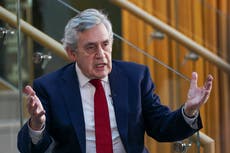Speaker of Lords warns against wholly elected Upper House of Parliament
Keir Starmer has backed plans to abolish unelected chamber

The Speaker of the House of Lords will today warn that a wholly elected second chamber could threaten parliament’s ability to deliver good and effective legislation.
Lord McFall of Alcluith’s warning comes just days after Labour leader Sir Keir Starmer gave his backing to a slimmed down and “democratically legitimate” upper house.
Sir Keir described the current unelected House as “indefensible” and said he hoped to be able to implement plans for reform drawn up by former prime minister Gordon Brown within the first term of a Labour government.
But in his first major speech on the future of the Lords today, Lord McFall will warn of possible negative consequences of a move to a fully-elected chamber, and caution that cross-party consensus will be needed for viable reform.
In an address to the Hansard Society, he will suggest that the Burns Committee, which previously produced recommendations to reduce the size of the Lords, could conduct a “fundamental, consensus-based review of workable options” for the future of the House.
In his report on Monday, Mr Brown said a Labour government should “clear out” the Lords and replace it with an elected Assembly of the Nations and Regions.
And Starmer said he wanted to see the change happen within five years of coming to office, as part of a package of constitutional reform to fix “a broken model (which) has held back our politics and held back our economy”.
But critics of the scheme have warned that an elected upper House would be likely to move away from its current scrutiny and revision role and seek to compete with the Commons for legislative power.
Lord McFall – a former Labour MP – will today accept the need for a reduction in the size of the 800-member House. But he will stress the value of a chamber which is “distinct from and complementary to” the Commons, rather than a copy of it.
“A wholly elected House could present fundamental challenges and threaten both the balance of our constitution and our capability across parliament to deliver good and effective legislation,” he will say.
“We need to be clear that reform proposals, if they are to be viable, need engagement and endorsement from government, from political parties across parliament.
“Previous failed attempts at far-reaching change illustrate that without agreement across parties even the most worthy proposals could be found wanting.”
Lord McFall, who took on the role of Lord Speaker in 2021, will say he backs reform of the second chamber.
“The House of Lords needs to keep up with the times, if it doesn’t, it will decline. And that’s bad for our politics and our democracy,” he will say. “It provides significant added value to parliamentary scrutiny and revision and is distinct from and complementary to the House of Commons.”
“The Lords should be smaller, more inclusive, and more representative of all parts of the United Kingdom. Membership of the legislature is a serious responsibility and brings with it a duty of public service. It is not a reward.”
Join our commenting forum
Join thought-provoking conversations, follow other Independent readers and see their replies
Comments



Bookmark popover
Removed from bookmarks